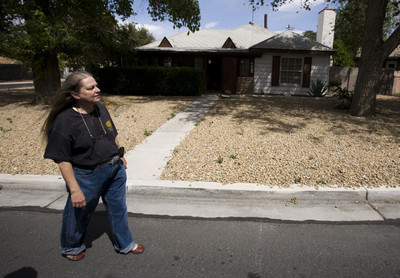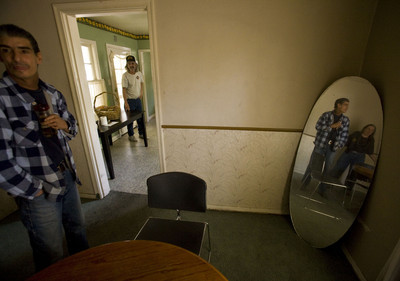Activist Sacco changes strategy on homelessness
Gail Sacco first made headlines three years ago for taking on the city's attempt to make it illegal to hand out food to the homeless in its parks.
The now 52-year-old activist for the homeless won that battle in 2007, with help from the American Civil Liberties Union of Nevada, when a U.S. district judge slapped a permanent injunction on a Las Vegas ordinance that prohibited such acts of charity.
But Sacco, who previously spent many of her days dishing out rice and beans to the down-and-out, has had a change of heart. She no longer believes dispensing edible handouts is the wisest way to help the homeless.
"I still believe we should have the right to share food with anyone we want," Sacco said. "But I've learned through experience there are more important ways to help."
Controversy over freelance feeding of the homeless by good Samaritans and church groups has resurfaced as a tent city has swelled in the downtown homeless corridor.
Long-established shelters, social service workers and public officials say those who dole out food might be doing more harm than good by removing the incentive homeless people have to get other help, including job training, as well as addiction and mental health treatment.
The Metropolitan Police Department, in an apparent effort to drive away the free-lancers, in March issued warnings to several of them for "stopping in the roadway."
Sacco isn't among those who think handing out sandwiches harms efforts to get the homeless more comprehensive help. But she has learned that doing so simply treats a symptom of homelessness; it doesn't do much to address the overall problem.
"Getting them into housing is first," she said. "You need one-on-one case management. You need to help them apply for Social Security and take them to the doctor."
Linda Lera-Randle El, director of the Straight from the Streets outreach program, which has been working with the valley's homeless for decades, agreed. She applauded what she called Sacco's "evolution."
"You can't let compassion overrule common sense," Lera-Randle El said. "Food has nothing to do with why people are homeless."
Lera-Randle El agrees with those who say the focus should be on services that can help get the homeless off the streets for good.
And that, instead of handing out food, is where Sacco these days focuses her passion to help the homeless. She and her husband have bought a second home, near Charleston Boulevard and Maryland Parkway, which they rent out for no profit to five homeless people.
One of them is 48-year-old Bret Brennan, better known as "Cowboy" for his love of rodeo and Westerns.
Brennan, who has throat cancer, lived on the streets 15 years or so before Sacco insisted he move into the house. The rugged, rail-thin man first become homeless after a breakup and, with the help of plenty of alcohol, quickly lost the will to be anything else.
Since Brennan moved indoors about a year ago, Sacco has helped him get disability benefits for an injury he received in a fall, Medicaid and a state ID.
She takes him to chemotherapy and other appointments and got him back in touch with his long-estranged mother in Northern Nevada.
Brennan is now able to pay Sacco $400 a month toward his rent and expenses.
"As tough as I was in my day, without Gail there's no way I could survive on the street as sick as I am today," Brennan said one late April afternoon while enjoying a beer in his tidy room.
Nor would he have gotten other services he needed, Sacco said.
"Once they have a roof over their heads, you can get them to go to doctors' appointments and mental health appointments. None of that would get done if they were homeless."
Sacco hasn't completely abandoned her practice of sharing food with the homeless; she does so on Sundays at Baker Park. But her focus now is on building community and getting to know people.
"Mostly I try to find out if there are other ways to help," she said.
Meanwhile, those who hand out food and other supplies in the downtown homeless corridor say they also are just trying to help. They also say simply giving people some of what they need doesn't discourage them from getting other services.
"It's kind of ridiculous to think that a blanket is enough that they'd rather not get back on their feet," said Geoff Sample, a member of Green Valley Christian Center. "Raising their misery index is probably not enough to change their mind-set."
Sample and other members were among those who received a warning from police in March while distributing food downtown.
He said the group does more than "throw lunch on the curb and drive off."
"We try to interact, pray with them, point them to the services that are available," he said. "We're part of the solution."
The short-lived practice of issuing police warnings for such behavior came to an abrupt halt in March after Deputy Police Chief Gary Schofield learned about it.
"We don't want to get in the way of people helping people," Schofield said. Still, "we want to make sure they do it safely."
Schofield and others worry that improperly handled food could make people sick. More than 100 homeless people, in fact, did get sick not long ago after eating burritos that were handed out downtown.
He also sees people dangerously dashing in and out of traffic to get it.
He would like "a more systematic, thoughtful approach to feeding people" downtown and has begun hosting discussions about it with downtown business owners, shelter workers, church groups and government officials.
Schofield advises those who would like to help the homeless to partner with agencies that exist for that purpose.
Although Sacco has shifted her focus, she still believes handing out food to the hungry serves an important purpose: "It gives people hope and lets them know someone does care."
But she doesn't believe it should be anybody's first or only way to combat homelessness.
She predicts others who distribute food will come around to her way of thinking.
"In the long run, the people doing what they're doing in the corridor, they're going to realize housing first is the most important."
Contact reporter Lynnette Curtis at lcurtis@reviewjournal.com or 702-383-0285.
Slideshow



















